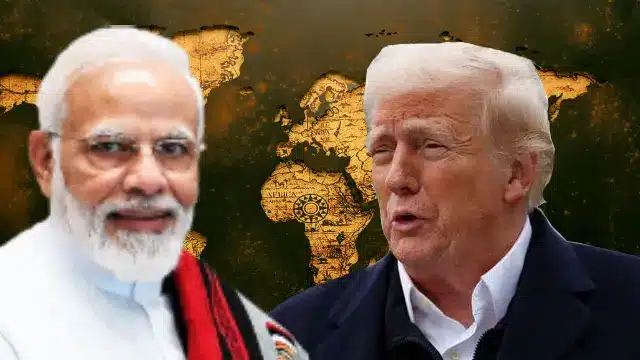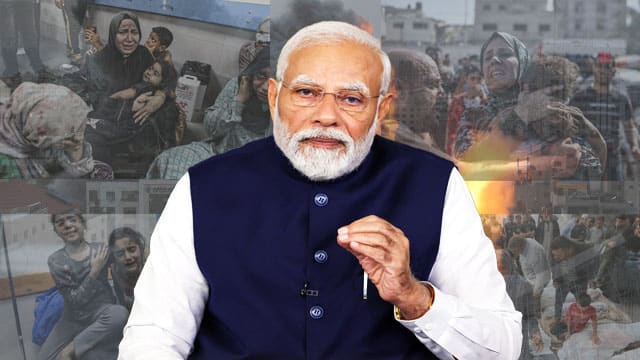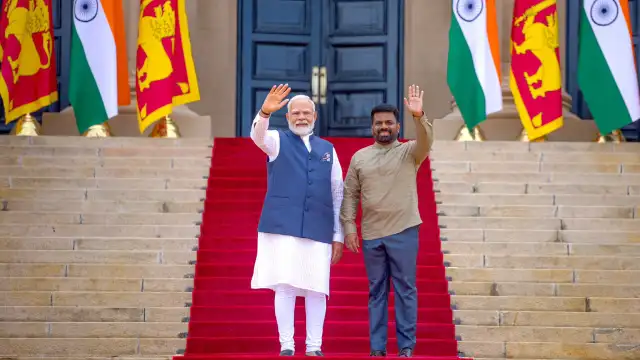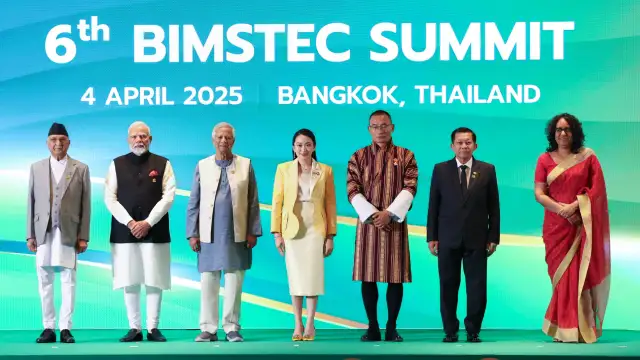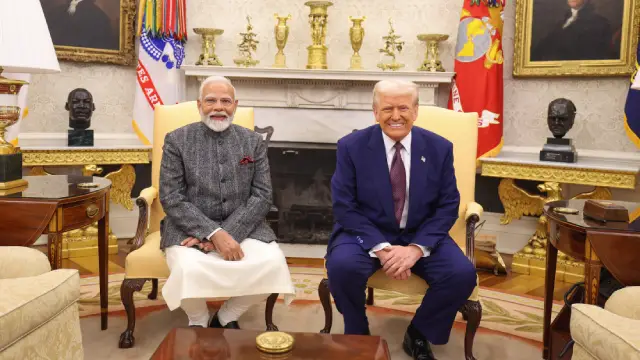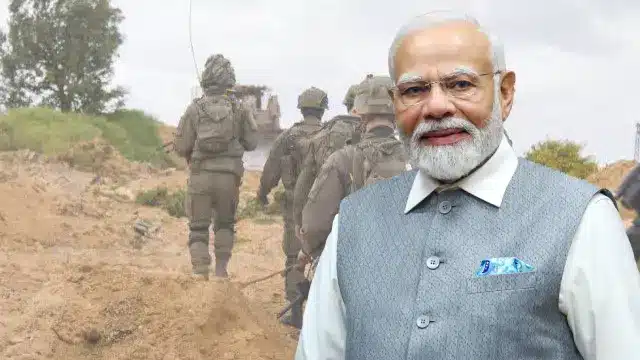While lambasting the Opposition, particularly Leader of the Opposition (LoP) Rahul Gandhi of the Indian National Congress (INC), Prime Minister Narendra Modi said a few days ago that people think talking about foreign policy makes them sound mature.
He made these comments while addressing the debate over the President’s address to the Parliament on February 4th, where he also suggested Bruce Riedel’s book “JFK’s Forgotten Crisis: Tibet, the CIA, and the Sino-Indian War” (2015) for the Opposition.
The book was mentioned because of its critical personal remarks on India’s first prime minister Jawaharlal Nehru, who’s blamed by Mr Modi and his ruling far-right Hindutva-driven Bharatiya Janata Party (BJP) for anything that goes wrong in India.
What Mr Modi was countering was Mr Gandhi’s allegations over the failure of his foreign policy to secure India’s long-term strategic interests.
However, in doing so, Mr Modi has raised further doubts over his claims of pursuing a foreign policy that promotes India’s ‘strategic autonomy’.
With this theory of ‘strategic autonomy’, Mr Modi’s External Affairs Minister S Jaishankar has been navigating the highly-polarised global geopolitical landscape and trying to balance India’s multilateral relations with warring camps.
One of the incidents of the last week questions Mr Modi’s government’s ‘strategic autonomy’ claim more than anything.
Last Tuesday, during his meeting with Israeli Prime Minister Benjamin Netanyahu, US President Donald Trump claimed that his government would occupy the ravaged Gaza Strip.
He claimed the US government would ensure development in the war-torn strip by levelling the ground, clearing the rubbles and detecting unexploded ammunitions. Mr Netanyahu obediently nodded to his proposals.
While the world, especially the Global South that Mr Modi claims India is representing and leading, expressed its anguish over the statement and the audacity to declare a forceful eviction of indigenous people from their land, India remained silent on the issue.
After January 16th, the Ministry of External Affairs (MEA) made no statement on Gaza. On its social media handle, the MEA has been promoting several things, but not any comment on the US’s Gaza occupation plan and evicting its population.
Why Gaza is important for India’s foreign policy?
For India’s strategic autonomy-driven foreign policy, it’s imperative for Mr Modi’s government to condemn the intention expressed by Mr Trump during his meeting with Mr Netanyahu. It’s evident that the eviction of its indigenous people from the Gaza Strip will re-colonise the Palestinian people’s rights.
Indian foreign policy has shifted a lot to the right from its left-ward tilt during the reign of Indira Gandhi, Mr Nehru’s daughter, in the 1970s.
Compared to Ms Gandhi’s tenure, India’s foreign policy approach regarding Palestine has become extremely meek in the third decade of the 21st century when, ironically, it’s economically and militarily stronger than it was in the 1970s.
Although Mr Modi has no inhibitions in hiding his special appreciation for Israel and Mr Netanyahu, his government still stands by India’s support for a free Palestine, with East Jerusalem as its capital, following the two-state solution that was agreed upon between the Palestine Liberation Organisation (PLO) and the Zionists according to the Oslo Accord.
In September 2024, during his visit to the United Nations General Assembly (UNGA), Mr Modi met Palestinian Authority’s President Mahmoud Abbas and reiterated India’s support for the cause of a free Palestine.
Moreover, although India initially took a pro-Israel stance following the October 7th Operation Al-Aqsa Flood by Hamas and refused to call Israel’s massacre of civilians an act of “genocide”, the MEA continuously reiterated that India believes the solution to the long-standing issue is rooted in a two-state solution.
This view conforms with the stance of the Global South and crucial BRICS member countries, including China and Russia.
Without a free Gaza and a free West Bank, a free state of Palestine can’t be established. The free Palestinian state is to be formed according to the 1967 borders and it’s the only thing that can guarantee long-term peace in West Asia.
India believes in this solution too and advocates for it. However, suppose the US government plans to occupy Gaza and forcefully evict the Palestinians using Israeli firepower. In that case, it won’t just violate the free Palestine agreement but also constitute a major crime according to the United Nations’ rules.
As a country that wants to play major roles in world affairs, India has the responsibility to oppose such adventurism proposed by Mr Trump that can not just jeopardise the peace and stability prospects of West Asia, a crucial region for India’s energy security, but also affect the prospects of India’s much-hyped India-Middle East-Europe Economic Corridor (IMEC) project that both Mr Modi and the Israeli leadership want to see materialised.
However, crucial countries, like Saudi Arabia, won’t join the plan or work with Israel until there is a move towards the creation of a free Palestine.
It will mean enough losses for Mr Modi’s closest tycoons like Gautam Adani who has invested a significant amount of money to buy over 70% stakes in Israel’s Haifa Port and is contemplating buying more ports in Greece and Italy, which can work as European gateways for IMEC.
Still, Mr Modi remains conspicuously silent on the issue, providing tactic support to the US-Israel lobby, sacrificing the ‘strategic autonomy’ quotient.
India’s foreign policy affects the Global South
Flashback to September 2023. In a glittering New Delhi, where slums were covered with glowing signages of India’s progress towards a developed country and praises for Mr Modi’s leadership, the G-20 Summit was held.
It was a historic summit because it admitted the African Union as a permanent member of the G-20 countries. In doing so, Mr Modi repeatedly claimed that India is going to uphold the interests of the Global South in the world and promote its causes.
Mr Modi several claims at the G-20 Summit to portray India as a leader of the Global South. However, as soon as the genocide in the Gaza Strip started, Mr Modi’s government sided with the Zionist forces, who faced the Global South’s opposition.
Among the international platforms like BRICS and Shanghai Cooperation Organization (SCO), Mr Modi took a distinct pro-US stance that went against other Global South countries.
Now, as the Global South is united in unequivocally condemning the plutocratic regime of Mr Trump on its Gaza plan, India remains mum, raising doubts over its foreign policy agenda and the claim of ‘strategic autonomy’.
India didn’t even react when Mr Trump threatened Cyrill Ramaphosa’s government for dragging the Zionist forces to the International Criminal Court (ICC). Mr Modi’s silence on the US threat to South Africa violates India’s long-standing support for South African freedom.
While Mr Modi negates India’s foreign policy legacies of the past, he also disregards his government’s position regarding the BRICS, SCO and other multipolar organisations by turning back to allies. This shows India’s double standards that can isolate in the crucial Global South.
What makes Mr Modi’s foreign policy meek?
Mr Modi’s foreign policy, driven by the so-called strategic autonomy doctrine, turns India meek in the global arena whenever confronting the US-led collective West as the dominant Gujarati corporate lobby that the prime minister represents, has a major stake in the economies of the US and the West. They have not only their capital invested, businesses tied with the West but they also attempt to make inroads into the power bloc of these countries.
In the US, the Gujarati lobby, which is also a major driving force of Mr Modi’s BJP and its Hindutva agenda, has a strong influence on the government. Even Mr Trump’s handpicked man to run the Federal Bureau of Investigation (FBI), Kash Patel, has a Gujarati origin.
Moreover, the big businesses, in both manufacturing and services sectors, look forward to the US and the collective West led by it as its principal export destination due to the higher purchasing power of the population.
India’s defence ties with the US and Israel and its tilt towards the West in foreign policy has been beneficial to big conglomerates like Gautam Adani’s Adani Enterprises and Mukesh Ambani’s Reliance Industries Limited, Mr Modi’s critics allege.
In the long-term perspective, Mr Modi’s foreign policy has taken India closer to the West, affecting its global image and its standing among the Global South. With the US-led West suffering immensely due to their economic crises, it’s a loss-making venture on which Mr Modi is gambling India’s wealth.
Even though the long-term impact of aligning with the West and sacrificing the interests of the Global South won’t be good for India, Mr Modi is taking the route to benefit a handful of his corporate supporters, critics allege. This jeopardises India’s interests, the interests of 1.4bn for the sake of a few.

